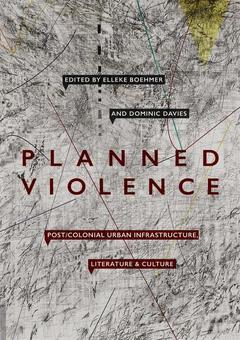Planned Violence, 1st ed. 2018 Post/Colonial Urban Infrastructure, Literature and Culture
Coordonnateurs : Boehmer Elleke, Davies Dominic

1 Planned Violence: Post/Colonial Urban Infrastructures, Literature and Culture Elleke Boehmer and Dominic Davies Section I Planned/Unplanned Cities .- 2 White Cities, Black Streets: Planned Violence and Native Maps in Richard Wright’s Chicago and Modikwe Dikobe’s Johannesburg Loren Kruger.- 3 Grey Space, Tahrir Laser: Conspiracy, Critique and the Urban in Julie Mehretu’s Depictions of Revolutionary Cairo Nicholas Simcik Arese.- 4 Thames Valley Royal (or, Maxwell in Oxford): The Story of a Football Club and the History of a City William Ghosh.- 5 Slums and the Postcolonial Uncanny Ankhi Mukherjee.- 6 The Not-so-Quiet Violence of Bricks and Mortar Zen Marie.- 7 Intervention I. What You Find in the River: Isolarion Ten Years On James Attlee Section II Forensic Infrastructures .- 8 The Intimacy of Infrastructure: Vulnerability and Abjection in Palestinian Jerusalem Hanna Baumann.- 9 Sound Systems and Other Systems: The Policing of Urban Aesthetic Spaces in the Poetry of Linton Kwesi Johnson Louisa Olufsen Layne 10 ‘Throwing Petrol on the Fire’: Writing in the Shadow of the Belfast Urban Motorway Stephen O’Neill .- 11 Writing the City and Indian English Fiction: Planning, Violence, and Aesthetics Alex Tickell 12 Blue Johannesburg Pamila Gupta.- 13 Intervention II. Take Me There Selma Dabbagh Section III Structural Violence, Narrative Structure .- 14 ‘A Shadow Class Condemned to Movement’: Literary Urban Imaginings of Illegal Migrant Lives in the Global North Ruvani Ranasinha 15 ‘A Dagger, a Revolver, a Bottle of Chloroform’: Colonial Spy Fiction, Revolutionary Reminiscences and Indian Nationalist Terrorism in Europe Ole Birk Laursen.- 16 Detecting World-Literature: (Sub-)Urban Crimes in the Nineteenth Century Upamanyu Pablo Mukherjee.- 17 Weird Collocations: Language as Infrastructure in the Storyworlds of China Miéville Terence Cave.- 18 Aquacity Versus Austerity: The Politics and Poetics ofIrish Water Michael Rubenstein.- 19 Intervention III. Control Courttia Newland.- 20 Afterword Sarah Nuttall Index.
Takes a comparative literary, interdisciplinary approach that distinguishes it from most research to date on urban planning and post/colonial violence, which tends to be purely sociologically or anthropologically based
Includes essays from contributors whose specialities range from colonial history to postcolonial geography
Analyses a wide range of media, from poetry, fiction and theatre/performance to graphic and visual cultures such as graffiti and comics art
Date de parution : 12-2019
Ouvrage de 349 p.
15.5x23.5 cm
Disponible chez l'éditeur (délai d'approvisionnement : 15 jours).
Prix indicatif 73,84 €
Ajouter au panierDate de parution : 12-2018
Ouvrage de 349 p.
14.8x21 cm
Thème de Planned Violence :
Mots-clés :
Social Geography; Cultural History; Modernity; Urban planning; Spaitial studies
